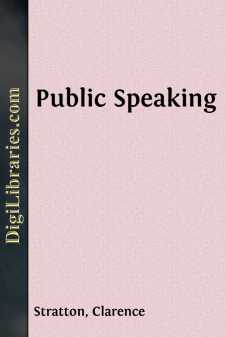Categories
- Antiques & Collectibles 13
- Architecture 36
- Art 48
- Bibles 22
- Biography & Autobiography 813
- Body, Mind & Spirit 142
- Business & Economics 28
- Children's Books 14
- Children's Fiction 11
- Computers 4
- Cooking 94
- Crafts & Hobbies 4
- Drama 346
- Education 46
- Family & Relationships 57
- Fiction 11828
- Games 19
- Gardening 17
- Health & Fitness 34
- History 1377
- House & Home 1
- Humor 147
- Juvenile Fiction 1873
- Juvenile Nonfiction 202
- Language Arts & Disciplines 88
- Law 16
- Literary Collections 686
- Literary Criticism 179
- Mathematics 13
- Medical 41
- Music 40
- Nature 179
- Non-Classifiable 1768
- Performing Arts 7
- Periodicals 1453
- Philosophy 64
- Photography 2
- Poetry 896
- Political Science 203
- Psychology 42
- Reference 154
- Religion 513
- Science 126
- Self-Help 84
- Social Science 81
- Sports & Recreation 34
- Study Aids 3
- Technology & Engineering 59
- Transportation 23
- Travel 463
- True Crime 29
Public Speaking
Categories:
Description:
Excerpt
CHAPTER I
SPEECH
Importance of Speech. There never has been in the history of the world a time when the spoken word has been equaled in value and importance by any other means of communication. If one traces the development of mankind from what he considers its earliest stage he will find that the wandering family of savages depended entirely upon what its members said to one another. A little later when a group of families made a clan or tribe the individuals still heard the commands of the leader, or in tribal council voiced their own opinions. The beginnings of poetry show us the bard who recited to his audiences. Drama, in all primitive societies a valuable spreader of knowledge, entertainment, and religion, is entirely oral. In so late and well-organized communities as the city republics of Greece all matters were discussed in open assemblies of the rather small populations.
Every great epoch of the world's progress shows the supreme importance of speech upon human action—individual and collective. In the Roman Forum were made speeches that affected the entire ancient world. Renaissance Italy, imperial Spain, unwieldy Russia, freedom-loving England, revolutionary France, all experienced periods when the power of certain men to speak stirred other men into tempestuous action.
The history of the United States might almost be written as the continuous record of the influence of great speakers upon others. The colonists were led to concerted action by persuasive speeches. The Colonial Congresses and Constitutional Convention were dominated by powerful orators. The history of the slavery problem is mainly the story of famous speeches and debates. Most of the active representative Americans have been leaders because of their ability to impress their fellows by their power of expressing sentiments and enthusiasms which all would voice if they could. Presidents have been nominated and candidates elected because of this equipment.
During the Great War the millions of the world were as much concerned with what some of their leaders were saying as with what their other leaders were doing.
See Great American Speeches, edited by Clarence Stratton, Lippincott and Company.
Speech in Modern Life. There is no aspect of modern life in which the spoken work is not supreme in importance. Representatives of the nations of the world deciding upon a peace treaty and deliberating upon a League of Nations sway and are swayed by speech. National assemblies—from the strangely named new ones of infant nations to the century-old organizations—speak, and listen to speeches. In state legislatures, municipal councils, law courts, religious organizations, theaters, lodges, societies, boards of directors, stockholders' meetings, business discussions, classrooms, dinner parties, social functions, friendly calls—in every human relationship where two people meet there is communication by means of speech.
Scientific invention keeps moving as rapidly as it can to take advantage of this supreme importance....


